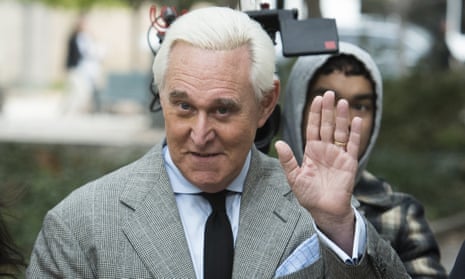Who is Roger Stone?
A master of the dark arts of politics who cut his teeth on a Richard Nixon election campaign. He regularly gives Nixon’s trademark salute and has a tattoo of the disgraced 37th president on his back. A self-described “dirty trickster”, Stone, 67, is also a longtime friend of Donald Trump.
When was Stone convicted?
In November he was convicted of seven crimes including obstruction of justice, lying to Congress and witness tampering. He was the sixth former Trump aide to be convicted in cases arising from the special counsel Robert Mueller’s investigation into Russian interference in the 2016 presidential election.
Why is he back in the news?
He is awaiting sentencing. On Monday, prosecutors recommended that Stone should serve seven to nine years in prison. But at 1.48am on Tuesday, Trump raised an objection via Twitter: “This is a horrible and very unfair situation. The real crimes were on the other side, as nothing happens to them. Cannot allow this miscarriage of justice!”
So he was just letting off steam again? What’s the big deal?
Later that day, against all protocol, the justice department overruled its career prosecutors and issued a memo saying their recommended sentence was too harsh. All four prosecutors resigned from the case in protest. There was an outcry from Democrats and legal experts who alleged that Trump had pressured the justice department, which is supposed to be independent, to do his pal a favour.
Did Trump admit it?
No. And the White House spokesman, Hogan Gidley, told reporters: “While he has the right to have a conversation with the attorney general, he did not.” Justice department officials also denied that Trump had meddled. But the president did tweet congratulations to the attorney general, William Barr, “for taking charge of a case that was totally out of control and perhaps should not have been brought”.
Where does Barr fit in?
Despite having served in the George HW Bush administration, Barr is rivalling the treasury secretary, Steven Mnuchin, and the Republican senator Lindsey Graham as Trump’s ultimate yes man. He memorably misled the public about the conclusions of the Mueller report. Media accounts suggest he personally intervened on Stone’s behalf.
What about Trump?
We told you so, say Democrats. They warned that acquittal in the impeachment trial would make Trump more convinced than ever that, like a monarch, he is above the law. Sure enough, he swiftly began a purge of officials who testified against him and now appears to be tweeting instructions to his attorney general.
What happens next?
Democrats say Barr has agreed to testify to the House judiciary committee on 31 March which, the Politico website points out, ends “a year-long standoff that began when the panel first demanded his testimony in the aftermath of special counsel Robert Mueller’s investigation”. He is likely to put up a pugnacious defence. Democrats are also seeking an investigation by the justice department’s watchdog, the inspector general. Republicans, as usual, are mostly mute.
And Stone?
He is due to be sentenced on 20 February by Judge Amy Berman Jackson, who may yet choose to ignore the revised memo and follow the prosecutors’ original recommended sentence. She certainly seemed unamused by Stone during the trial, ticking him off over his use of social media. But the other big question is: will Trump pardon Stone?
What can be done to save the rule of law?
Democrats have already deployed their ultimate constitutional weapon, impeachment, and will not reach for it again in an election year. But they can try to make it an issue in the presidential race. The presidential candidate Elizabeth Warren tweeted: “Americans of all political stripes should be gravely concerned about the corruption that pressures federal prosecutors to give sweetheart deals to criminals who do their crimes on behalf of Donald Trump. Yes Roger Stone, I’m looking at you.”
Ultimately, however, will anyone care?
Critics say the erosion of democratic institutions continues and the integrity of the legal system is on the line. Brian Schatz, a Democratic senator from Hawaii, wrote on Twitter: “The DOJ itself appears to have been corrupted by a President who rewards his friends and punishes his enemies. Media should treat this like a potentially explosive abuse of power even if this takes more than ten seconds to explain.”
